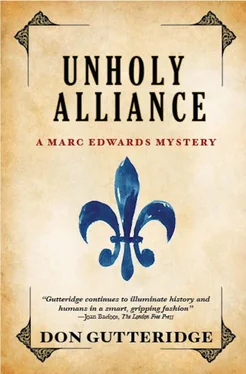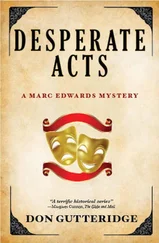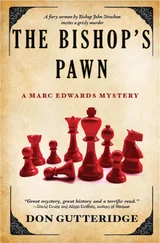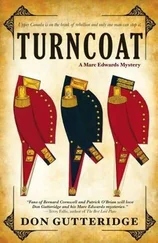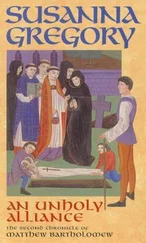Don Gutteridge - Unholy Alliance
Здесь есть возможность читать онлайн «Don Gutteridge - Unholy Alliance» весь текст электронной книги совершенно бесплатно (целиком полную версию без сокращений). В некоторых случаях можно слушать аудио, скачать через торрент в формате fb2 и присутствует краткое содержание. Год выпуска: 0101, Издательство: Bev Editions, Жанр: Исторический детектив, на английском языке. Описание произведения, (предисловие) а так же отзывы посетителей доступны на портале библиотеки ЛибКат.
- Название:Unholy Alliance
- Автор:
- Издательство:Bev Editions
- Жанр:
- Год:0101
- ISBN:нет данных
- Рейтинг книги:5 / 5. Голосов: 1
-
Избранное:Добавить в избранное
- Отзывы:
-
Ваша оценка:
- 100
- 1
- 2
- 3
- 4
- 5
Unholy Alliance: краткое содержание, описание и аннотация
Предлагаем к чтению аннотацию, описание, краткое содержание или предисловие (зависит от того, что написал сам автор книги «Unholy Alliance»). Если вы не нашли необходимую информацию о книге — напишите в комментариях, мы постараемся отыскать её.
Unholy Alliance — читать онлайн бесплатно полную книгу (весь текст) целиком
Ниже представлен текст книги, разбитый по страницам. Система сохранения места последней прочитанной страницы, позволяет с удобством читать онлайн бесплатно книгу «Unholy Alliance», без необходимости каждый раз заново искать на чём Вы остановились. Поставьте закладку, и сможете в любой момент перейти на страницу, на которой закончили чтение.
Интервал:
Закладка:
Erneste Bergeron, the fourth member of theFrench contingent, spoke very little, perhaps because he spokelittle English (though it was clear that he understood a greatdeal) or perhaps because he, like LaFontaine, was reserved bynature. He was a handsome, slightly balding fellow of fifty years,with placid, hazel eyes in which kindness and tolerance weresuffused with an abiding sadness. Indeed, his whole countenanceseemed to droop, and he appeared to find it difficult to smile atpoints where his patrician manners dictated that he ought to. Foralthough Bergeron was not a true patrician — a grand seigneur ormember of the ancient landed aristocracy of Quebec — he had madehimself an extensive and influential landowner. He was also adevout Roman Catholic, according to Robert.
As the dessert was being served — apple tartgarnished with walnuts and topped with fresh cream — Marc took amoment to study the servants, for he had sensed a certain tensionin that quarter during the other courses of the meal. The dishesthemselves arrived on a dumb-waiter, and were served to the guestsby Austin Bragg and the parlour-maid, Priscilla Finch. The latterwas a pretty, flaxen-haired young woman with nervous blue eyes.Bragg was darkly handsome and, oddly for a manservant, wore anexpression of barely restrained belligerence. Both were in uniformand equally skilled at their work. They had obviously beenwell-trained by the deceased butler, Alfred Harkness.
But whenever the new butler, Graves Chilton,uttered a quiet word of instruction or came within an arm’s lengthof either of his underlings, as he did several times while pouringout the wine with practised ease, they would recoil with anoticeable shudder — of fear or revulsion. Chilton himself seemedaware of this response, for Marc watched him carefully keep hisdistance whenever he could, and offer any necessary directives witha curt nod or small wave of his right hand. Certainly thisdiscretion on his part was in marked contrast to the louddressing-down he had given Bragg earlier in the foyer. And althoughMarc realized that he had taken a dislike to Chilton (who remindedhim of supercilious servants he had encountered as a youth back inEngland), he nonetheless felt sorry for him. It was not easyreplacing a long-time and much revered employee in a settledhousehold.
When Garnet Macaulay indicated that luncheonwas concluded and suggested that the gentlemen meet in the libraryfor the inaugural session of their conference, LaFontaine noddedagreement and said in carefully enunciated English, “Please offermy congratulations to your cook for a most delicious meal. We lookforward to supper with as much anticipation as we do theconversations to come.”
Macaulay’s cook, Mrs. Noreen Blodgett, wasrenowned throughout the capital and beyond, and Macaulay smiledbroadly on her behalf. The historic gathering had gotten off to afine start.
It was decided that the Quebec delegates would speakin French, slowly and formally where possible, and the UpperCanadians likewise in English. And while much would be understoodby the listeners on both sides, Marc would translate the gist of agiven speech and be available for clarifications as mattersprogressed. It was not an ideal protocol for a set of toughnegotiations among participants who felt variously aggrieved andalienated, but it would have to do. On the positive side, more thana dozen lengthy letters had been exchanged between LaFontaine andHincks since September, so that the main points of contention andinitial positions were already known. It was the presence ofLaFontaine’s associates that was worrisome.
It was also decided that no written record ofthe meetings would be made. Individuals could make notes if theywished to and pen private summaries after each session, wheredesirable. But only if a formal accord were reached by Friday wouldanything be crystallized in writing. It was assumed, of course,that all participants were honourable, sincere, and cognizant ofthe need for continuing secrecy — whatever the outcome.
No-one objected to Robert Baldwin beginningthe debate by outlining the general plan and its principalobjectives, for it had been he and Hincks who had conceived it andmade overtures to the Quebec radicals through LaFontaine. In hisplain, forthright style, Robert presented the scheme as if hisaudience were hearing it for the first time, which, in the case ofLaFontaine’s associates, might well be true. The proposed newLegislative Assembly would be composed of forty-two members electedfrom Lower Canada (to be renamed Canada East) and forty-two fromUpper Canada (to be renamed Canada West). The united provinceswould be called, simply, Canada or, more familiarly, the Canadas.If the anticipated elections were fair and gerrymandering held to aminimum, they might assume that a sizeable number of partiRouge members would be returned from Canada East, as there hadbeen widespread support for its active involvement in the armeduprising and even for the violent incursions from the United Statesthat had followed it in 1838. Those members of the Frenchestablishment remaining after the social upheaval of a decade — seigneurs, churchmen, and the few entrepreneurs and placeholderswho had thrived under British rule — would make sure that a rumpgroup of their own reached the new Assembly as the Bleu party.
Meanwhile in Canada West, the fractured anddispersed Reformers were slowly regrouping, and hoped to takefifteen or more seats of their allotted forty-two. Their opponentswere now irretrievably splintered. The expedient coalition ofraucous Orangemen, recalcitrant churchmen, dyed-in-the-woolroyalists, Family Compact opportunists propped up by successiveGovernors, and moderate conservatives with an eye to theadvancement of commerce — this house of cards, Robert assured thedelegates, had begun to collapse under the weight of armed civilconflict, widespread social unrest, repeated crop failures, and theparalysis of the banking system. While they might be able to electa majority in Canada West, they would be unable to operatecohesively in the new Assembly. It could be taken for granted,Robert concluded with the hint of a smile, that each Torysplinter-group would defend its own shrinking turf and that theirright-wing counterparts from Quebec would do the same.
Marc noted with satisfaction that the Frenchdelegates seated across the conference table from him werelistening intently as he took Robert’s workmanlike English andrendered it into passable French. He could tell from theirexpressions that they realized only one conclusion could be drawnfrom Robert’s initial analysis: the new joint Assembly would beripe for a takeover by any group with a coherent policy and sharedgoals. And such a group might conceivably be comprised ofreform-minded members from two sources who were thought to beimplacable antagonists: alienated, French-speaking rebels andnon-combatant, English-speaking politicians. Even Tremblay’sperpetual scowl softened for a moment at that deliciouspossibility. LaFontaine himself, Marc noted, spent most of his timeobserving his own countrymen from his position at the far end ofthe table.
“So you see, gentlemen,” Robert summed up,“the opportunity to seize control of the Assembly is going topresent itself. Of that there can be no doubt. The question is, canwe form a party of Rouge and Reform with common goals andpolicies?”
At this remark, everyone turned toLaFontaine, but he said nothing. His expression was impassive. Hesimply waited, unperturbed, as the silence grew and bright sunlightpoured into the room from the high windows in the south wall.
Daniel Bérubé cleared his throat nosily.“What’s the use of controlling the Assembly when the LegislativeCouncillors will be appointed for life by the governor and willhave the authority to thwart our progressive legislation, as theyhave done in the past?”
Читать дальшеИнтервал:
Закладка:
Похожие книги на «Unholy Alliance»
Представляем Вашему вниманию похожие книги на «Unholy Alliance» списком для выбора. Мы отобрали схожую по названию и смыслу литературу в надежде предоставить читателям больше вариантов отыскать новые, интересные, ещё непрочитанные произведения.
Обсуждение, отзывы о книге «Unholy Alliance» и просто собственные мнения читателей. Оставьте ваши комментарии, напишите, что Вы думаете о произведении, его смысле или главных героях. Укажите что конкретно понравилось, а что нет, и почему Вы так считаете.
